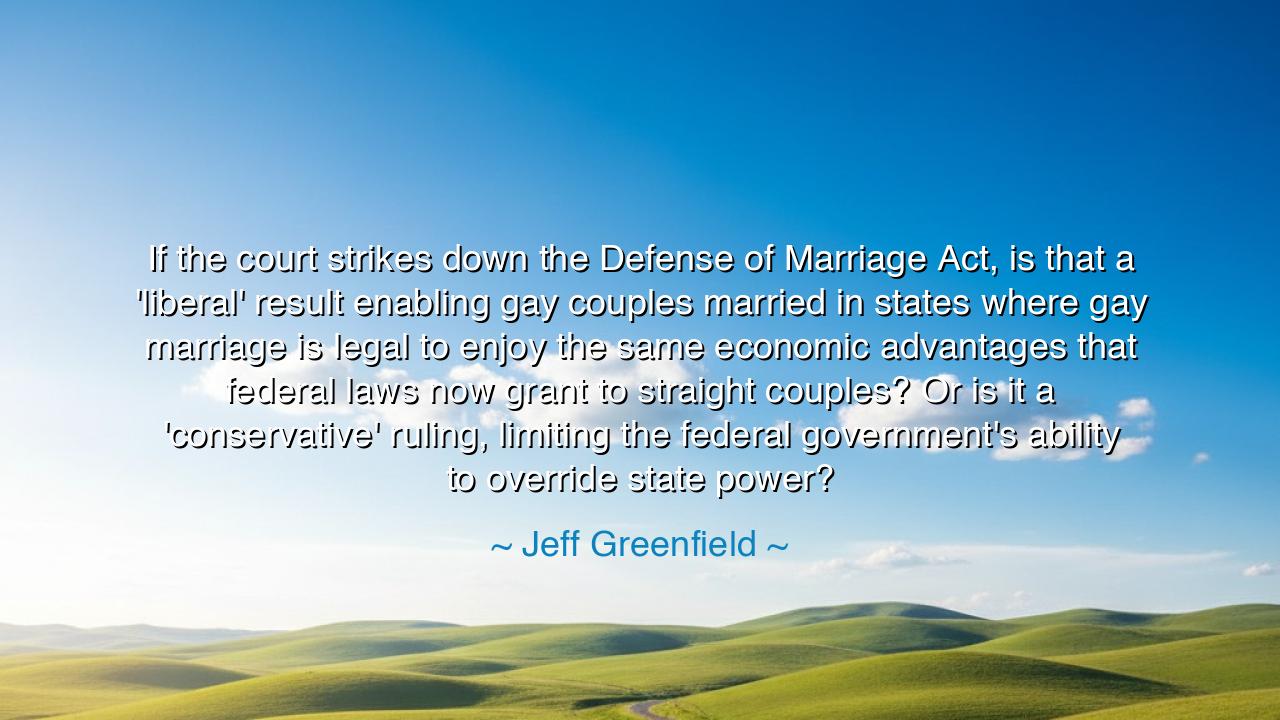
If the court strikes down the Defense of Marriage Act, is that a
If the court strikes down the Defense of Marriage Act, is that a 'liberal' result enabling gay couples married in states where gay marriage is legal to enjoy the same economic advantages that federal laws now grant to straight couples? Or is it a 'conservative' ruling, limiting the federal government's ability to override state power?






In the ever-turning struggle between law and liberty, Jeff Greenfield spoke with clarity when he said: “If the court strikes down the Defense of Marriage Act, is that a ‘liberal’ result enabling gay couples married in states where gay marriage is legal to enjoy the same economic advantages that federal laws now grant to straight couples? Or is it a ‘conservative’ ruling, limiting the federal government's ability to override state power?” These words, calm yet cutting, reveal a truth long obscured by the noise of politics — that justice does not always obey the labels of party or ideology, and that the wisdom of law must be measured not by who wins, but by what principles endure.
The origin of this quote lies in the great national debate surrounding the Defense of Marriage Act (DOMA), a 1996 law defining marriage for federal purposes as a union between one man and one woman. When the U.S. Supreme Court heard the case United States v. Windsor in 2013, the nation’s political lines seemed clearly drawn: liberals championed its repeal in the name of equality, while conservatives defended it as protection of tradition. Yet Greenfield, a seasoned political observer, saw deeper currents. He asked — with the dispassion of the philosopher and the precision of the jurist — whether the Court’s decision would truly belong to either camp. For if the federal government overstepped its rightful boundaries, would not striking down DOMA also affirm a conservative ideal — the sovereignty of the states? Thus, in a single question, he exposed the folly of thinking that truth can ever be confined within the walls of ideology.
His insight recalls the debates of the founding generation, when men like James Madison and Alexander Hamilton argued over the balance between federal and state power. To Madison, liberty was safeguarded when power was divided; to Hamilton, it was secured when the federal government stood strong. But both knew that truth was not absolute — that the law must adapt to circumstance and principle alike. Greenfield’s reflection stands in this same lineage of thought. He reminds us that the struggle between liberal and conservative ideals is not a battle between good and evil, but between competing visions of freedom — one seeking equality through collective justice, the other through limited government. The wisdom of the court, then, lies not in choosing sides, but in harmonizing these forces as the ancients balanced fire and water.
There is also a deeper moral wisdom in Greenfield’s words — a recognition that labels blind the mind. When the citizen sees every ruling, every law, every judgment through the lens of partisanship, truth becomes irrelevant. The ancients knew this danger. In Athens, the philosopher Socrates was condemned not for wrongdoing, but because the people could no longer separate justice from politics. They saw only threat or ally, not truth or falsehood. Greenfield’s question calls us to escape this blindness — to see that the law, in its highest form, must transcend allegiance. For justice belongs not to the left or the right, but to the eternal realm of reason, where what is right endures regardless of who claims it.
The story of h Windsor, the woman at the heart of the case, gives flesh to Greenfield’s meditation. Windsor had lawfully married her partner in Canada, and when her spouse died, the federal government denied her the spousal tax exemption because of DOMA. She paid hundreds of thousands of dollars in taxes that a heterosexual widow would have been spared. Her fight was not for wealth, but for recognition — for the law to see her humanity as equal in worth. Yet in striking down DOMA, the Court did not only vindicate her rights; it restored the principle that the federal government cannot nullify what the states have already declared lawful. Thus, the ruling became both liberal and conservative, both revolutionary and traditional — a reaffirmation that liberty grows not from uniformity, but from balance.
In this, Greenfield teaches a lesson worthy of the ancients: that truth dwells at the intersection of opposites. The wise must learn to think beyond faction — to ask not “Who gains?” but “What is right?” For when justice is reduced to a weapon of ideology, it ceases to be justice at all. The fall of many republics began not with tyranny, but with citizens who saw every judgment as partisan victory or defeat. The preservation of freedom demands that we, like Greenfield, question the easy labels, and seek instead the deeper logic that unites the apparent contradictions of law and liberty.
Let this be the enduring teaching: wisdom lives where division ends. Whether the matter concerns marriage, governance, or the shape of justice itself, let us remember that every truth carries two faces — one of compassion, one of restraint — and that both must be honored if civilization is to endure. For when the law rises above politics, it becomes more than human will; it becomes the voice of reason itself, speaking across generations. And so Greenfield’s question is not merely about a case or a court — it is a call to all who seek truth: to look beyond the banners of party and find in every judgment the eternal balance of freedom and order, compassion and restraint, that defines the noblest path of humankind.






AAdministratorAdministrator
Welcome, honored guests. Please leave a comment, we will respond soon